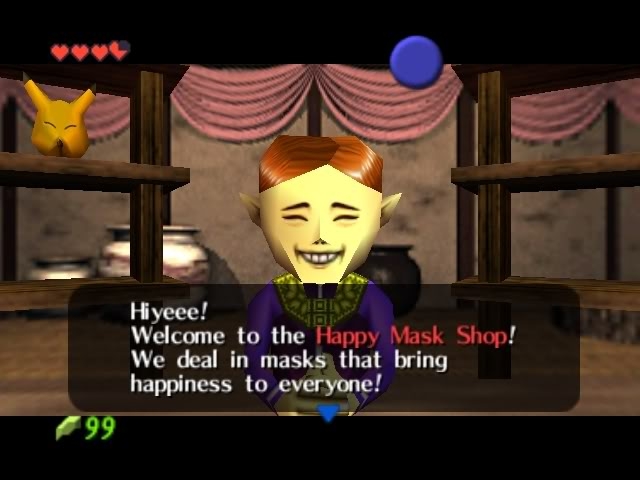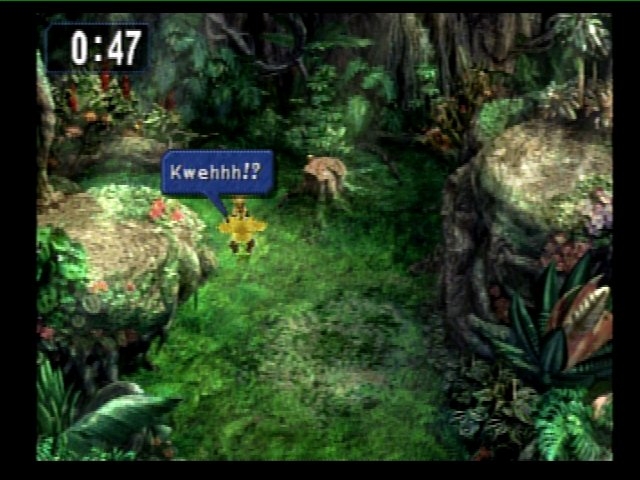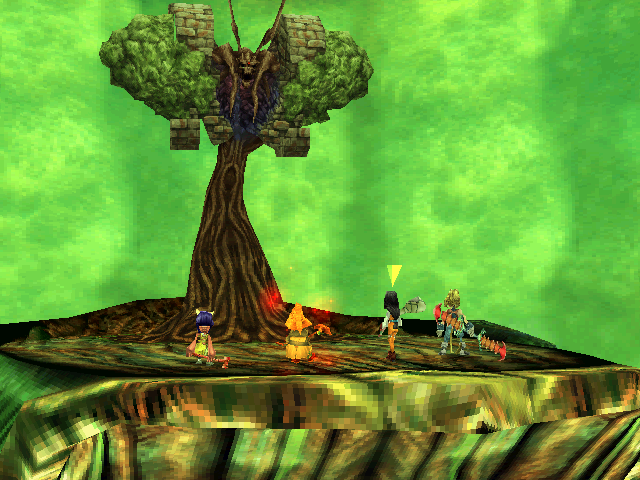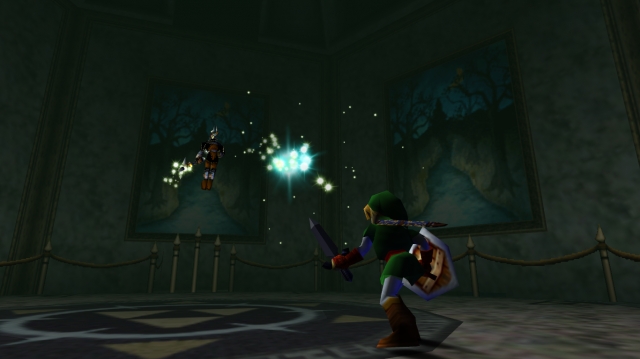Final Fantasy IX vs The Legend of Zelda: Ocarina of Time - Part Two
Welcome back guys and girls. If you're reading this then it probably means that you've already perused part one of this article and have been desperately hanging around the GameGrin website in anticipation of part two ever since. Modesty always was my strong suit.
If you've only just discovered the internet and haven't read part one yet then you can do so here.
The first area that I'd like to focus on this week is replayability. Which title are you more likely to pick up and play again in the future, or even straight after completing it for the first time? Both games have plenty of reasons for you to want to do this, whether it's side quests, missed treasure or purely for the love of the game.
In Ocarina, much like lots of other RPG titles, there are plenty of side quests and puzzles that you can skip the first time you play the game but which you're going to be more inclined to do on your subsequent playthroughs. The most apparent of these (in my opinion) are the gold Skulltula tokens you can collect by defeating these noisy, wall-scuttling little pests. When you first encounter the Skulltulas and manage to earn your first token, there is no explanation as to what they might do. It's only later when you come across Kakariko Village and specifically Skulltula House, that all starts to become apparent. I'm not going to go into the finer details of this side quest but needless to say that trying to find all 100 gold Skulltula tokens will take up quite a lot of your time.

The other big side quest in Ocarina is the Happy Mask Shop. This first occurs relatively early in the game when a Hylian soldier asks you to bring him a mask for his son. An innocent enough request, you might think. Before you know it however, the owner of the Happy Mask Shop has got you running all over Hyrule in a big game of 'match the mask to the prospective client'. Though there is a certain amount of logic that you need to apply to this quest, it is almost certainly more based on trial and error. Locating the correct person can sometimes become infuriating, to say the least.
Two of the biggest side quests in FF9 are intertwined and you cannot do one without the other. The first of these lies within Chocobo's Forest. When you first encounter Chocobo's Forest, you have a nice little natter with a moogle named Mene. He offers you a game of Chocobo Hot and Cold for a mere 60 gil (the in-game currency) which is well worth the investment. That 60 gil gets you 60 seconds of game time in which to use Mene's chocobo 'Choco' to dig for treasure. Using a simple and effective system to tell you how close to treasure you are digging (via a series of 'kweh' sounds from Choco) you can uncover potions, elixirs, gil and much more. The most important items you can find though are 'Chocographs' and 'Chocograph Pieces' which are essentially treasure maps leading to...yup, you guessed it, treasure! Whilst using these treasure maps, you'll occasionally find a treasure chest containing mist. Finding these will teach Choco a new ability ranging from scaling mountains and wading across the ocean to the ability to fly around the world (with the added bonus of Choco turning gold). So what's the point in all of this? Why, ultimate weapons of course!
Every character in FF9 has an ultimate weapon which can generally only be obtained by finding it in a hidden location on the world map. Most of these locations are only accessible by Choco. For example, Zidane's ultimate weapon 'Ultima' can only be found on disc 4 after the Shimmering Island has been destroyed. As it's in the middle of the ocean (as well as being underwater) you need to take Choco to the exact point that the Shimmering Island is marked on the map and make it dig. If you want to have the best weaponry in the game (and therefore the upper hand in battle) then it's well worth investing your time.

So which game wins the battle of the replays? It took me a long time to decide but I eventually settled on FF9. I've played through both games at least 3 times each (and I'm currently on my first playthrough of The Ocarina of Time Master Quest, but that's another story) but I chose FF9 because the side quests were simply more fun. That's not to say that Ocarina's aren't. Far from it. Somewhere along the line though, something had to give and any game involving chocobos, treasure hunting and ultimate weapons has my vote.
So FF9 just edges ahead with the score now at 2-1.
The next category up for comparison has to be bosses and boss fights. We all know the pain of nearing the end of a dungeon, treasure chest in sight gleaming brightly, taunting you with the trinkets that lay inside before...BOOM! Enter the end of level boss to undo your hard work and frustrate you to the point of despair, yelling at your television and throwing your pad across the room. Just me? Ahem...moving on.
Boss fights in FF9 work in much the same way as entering into any other battle, with the exception of increased drama in the battle music, of course. The general rule with bosses in FF9 (in my opinion, at least) is that if you’re unaware of their strengths and weaknesses prior to the battle then using “Scan” is the first thing you should do. As I mentioned last week, this information can become invaluable against bosses such as Soulcage in the Lifa Tree.
Maybe it’s just my terrible memory acting up again but my problem with FF9 bosses is that there are very few memorable ones. Granted, it’s been 18 months or so since I last played it but very few boss fights stand out for me. Unlike in FF7 where you had bosses such as the Diamond and Emerald weapons, there just aren’t many iconic bosses of note in FF9. I’m coming back to the combat system here but I do think this has a lot to do with it. Since there’s not really any change in how you fight the bosses in FF9 (apart from the fact that they can last much, much longer than a normal fight) I think that some of the importance of the battle can get lost on you. There’s not really much variation and that makes most of the battles sort of blend in.

Compare that with the battles in Ocarina and you couldn’t be further from the truth.
The thing I like the most about boss battles in Ocarina is that it’s never as easy as just running in with your sword and hacking away at your adversary. Every boss battle requires a large element of thought, timing and trial and error. One of the best examples of this that I can give is when you fight Phantom Ganondorf at the end of the Forest Temple. Aside from Navi’s “hints” (if you’ve played Ocarina then you’ll know just how unhelpful they are) you enter the battle without any knowledge of how you’re supposed to defeat him.
You’re stood in the middle of a hexagonal room with six identical pictures hanging on the wall. Phantom Ganondorf appears in the room on his horse and after giving you an evil stare for a few seconds, jumps into one of the pictures. After a few seconds, two Phantom Ganondorfs come running up the paths of two of the six pictures. Within a very short space of time, you have to figure out which is the real Phantom Ganondorf and which is the fake by shooting them with your bow. Choose incorrectly and as the real one jumps out of the picture, you’ll get shocked with a bolt of lightning that deals huge damage. Pick the right one and he’ll turn on his heels and jump straight back into one of the pictures.
Once you’ve repeated this process a few times, Phantom Ganondorf will then come out of the picture and hover around the middle of the room firing orbs of lightning at you. Since he’s hovering fairly high, you can’t hit him with your sword and your bow seems to do no damage to him, so what do you do? Play tennis with him of course! After much dodging, blocking, thinking on your feet as well as trial and error, if you were to try swinging your sword at the lightning orb, you’d notice that it sends it flying back towards Phantom Ganondorf. You will then engage in a game of life or death tennis with him. Mistime your swing and you get pelted with lightning, time it right and after an intense rally with the speed ever increasing, you’ll manage to hit him with the orb. Phantom Ganondorf will be momentarily stunned and fall to the floor, at which point you have to run over and slash him with your sword before the stun wears off. Repeat this process a few times and you will eventually defeat him.

The thing about Ocarina boss battles that I love the most is that they’re all like this. No matter what the boss, there’s always an obscure way of defeating it. Using lateral thinking in an intense battle might not be everyone’s cup of tea, but I can honestly say that I’ve never derived more satisfaction in defeating a boss than I have on Ocarina. For that reason, Ocarina has to win the battle of the bosses. Cue victory music!
By my count, that’s 2-2 between these epic RPGs.
Ok, so let’s recap. Across these two articles we’ve covered storylines, combat systems, replayability and boss fights. In my opinion, these are four of the most essential ingredients in making a successful RPG that will not only be revolutionary at its date of release but, perhaps more importantly, withstand the test of time. To this day, it still surprises myself and my friends if someone mentions that they’ve not played either of these games and I think that’s testament to just how good they really are.
So with that, I’m going to have to declare this one a draw. As anticlimactic as that result may be, I simply couldn’t pick a winner between these two games. Since I first started writing this article two weeks ago, I didn’t have any idea in my mind about which one would come out on top. Throughout this time, my opinion has changed almost daily as I’ve been writing about the pros and cons of each game respectively.
The only thing left for me to do is to tip my hat to their respective creators: Shigeru Miyamoto of Ocarina and Hironobu Sakaguchi of FF9. Without them, we’d have two fewer things to be able to reminisce about or two fewer games to pull out, dust off and put on for old time’s sake and I think that is one of the most special gifts that can be given in the world of video games.






COMMENTS